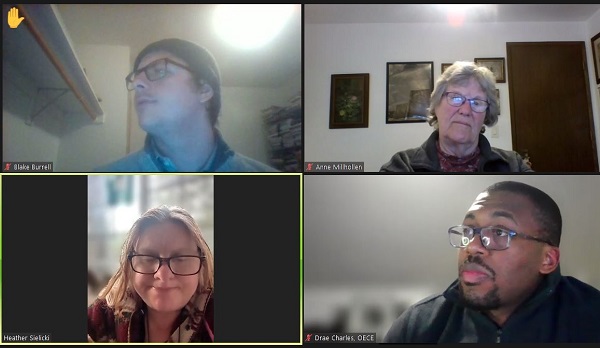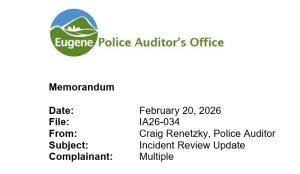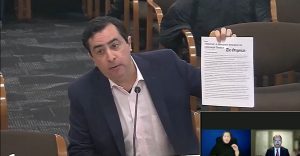Advocates find ‘significant’ differences in homeless data reported by police, city court
7 min read
A city work group hears concerns about data quality on homelessness—citation counts from Eugene Police don’t match the number of cases in Municipal Court. Also on March 14 at the Homelessness and Poverty Work Group, a recap of the public hearing on renter protection.
[00:00:18] Richard Self (Homelessness and Poverty Work Group member): Yeah, I attended that four-hour-plus meeting. There were three protections offered: protections for diminishing security deposits to two and a half times; protections about first come, first serve application basis; and then the relocation assistance.
[00:00:34] A lot of small mom-and-pop landlords were asking for exemptions, especially the one that gives people money to move if they are evicted, especially for no cause. And they wanted to be exempt and leave that to big corporate rental agencies. There was a big to-do about that, where many landlords threatened to sell their rental properties rather than stay with that.
[00:01:03] It should be noted that the author of the Portland renter protections said that since their renter protections went into effect, the housing market has never been better. And these ideas that the landlords need to sell and so forth, that’s not happening, and that they’re even doing better than they were before the rental protection.
[00:01:25] In all of that, all the testimony and all the discussion, nobody’s talking about income-based rentals. These are not just affordable housing, but affordable housing for those who are on Social Security, those people who make such a low income, it’s not even near 80% of median income. They’re not near it. They couldn’t afford a $1,200 (per month) place plus security deposit. They couldn’t afford anything. And that needs to be something that’s written into the rental protections.
[00:01:57] I can’t stress it hard enough. Income-based affordable housing should be part of the rental curriculum that we’re doing. Brian Obie is building 700 units. There’s a 12-story building that’s going up on 13th and Alder, and I hear nothing from these entities nor anything that Phil Knight builds about income-based affordable housing. So that needs to be part of this, and as soon as possible.
[00:02:25] So just some news and notes of a four and a half hour meeting last night.
[00:02:30] John Q: Richard also asked that we stop using the term ‘camping.’
[00:02:33] Richard Self: I submit that we get rid of the language of ‘camping’ from any further legislation or anything like this because nobody out there is camping. Camping is something you do when you’re rich and you have money during the summer. Nobody out there is camping. They’re surviving.
[00:02:49] John Q: Statistics from the police don’t match those from the court.
[00:02:54] Heather Marek (Homelessness and Poverty Work Group member): So you guys know I’ve had an ongoing segment here whenever we get data from EPD (Eugene Police Department) regarding policies that we’ve identified which criminalize folks for resting and living outdoors.
[00:03:08] EPD gave us 19 citations—I just wanted to highlight a concern I have about this. I also requested data from the Eugene Municipal Court. And the court data showed that actually there were 35, so significantly more. And actually every single one of them had been initiated by an EPD ticket.
[00:03:31] And every single one of them, all 35, had been issued to people who were identified as ‘transient,’ in other words, experiencing homelessness. And I think our data had shown that maybe not all of them were.
[00:03:44] So anyway, it was disconcerting to me because we’re trying to understand how these policies are playing out on the ground and how they’re impacting people, what enforcement actually looks like, so it can inform the recommendations that we make. And that requires that the information we’re receiving is accurate. I was disappointed.
[00:04:07] Blake Burrell (Homelessness and Poverty Work Group chair): I think the idea of suggesting a process and looking at data quality because, in one manner this is a public meeting and we presented data to the public that was incorrect with the data that they provided, which does seem to be a public transparency issue.
[00:04:22] Because I know that some of us have taken those statistics and the information we generalized and communicated that throughout community and networks. And I think that when we’re talking about instilling public trust in government and talking about critical human rights issues we can’t have incorrect data.
[00:04:38] It’s just delegitimizes us and it’s honestly it’s just a huge issue. And that’s just from an administrative point of view.
[00:04:47] Richard Self: We should make this information public. I think it’s important to rebuke the mythology about homeless people that they got it easy and they just want to do all these things and they’re having a good time camping. Whereas this kind of data especially being incorrect just shows the bias of the police department in this.
[00:05:09] I don’t think it was a mistake. I don’t think it was an oversight. I think it was done on purpose to thwart what we do here. I’ve been homeless for a long time and I know how things really work and how things look on the outskirts. People don’t know what’s going on because they’re not getting any public information about what’s going on.
[00:05:31] The more public information about this, the more we can really have a conversation.
[00:05:36] I think those numbers belie the real numbers. I think those are very conservative estimates of what’s going on. I think it’s a lot more, and now we have a new sinister element to all of this, and that is ‘suspected camping’ where people have their vehicles either RVs or regular vehicles just towed at a moment’s notice because they are ‘suspected of camping.’ This not only is prevalent to those who are unhoused, but to regular people as well. There is a Lane County employee that almost had her RV towed under these auspices.
[00:06:16] This is very selective. If grandma and grandpa pull up at their grandkids’ home in their pretty much new 800-foot RV, they’re not going to be suspected of camping, apparently. A vehicle can have tags all over it from the police saying it needs to be moved, it’s in violation, it needs to be towed. And other vehicles that are suspected of having people camping in them are towed with no tags whatsoever, no warning whatsoever. And this is happening more often now than it is has ever been.
[00:06:52] Heather Marek: I think part of the problem is the way the law is written, it prohibits people from setting up a spot or staying there with bedding for temporary living purposes. And it’s like: What the heck does that mean? And what we see is that it basically means whatever the enforcement officials think it means.
[00:07:11] And it just is enforced against people who are suspected of experiencing homelessness, basically. I mean, that’s what the data shows and we know there are people who own RVs around town. But if you’re suspected of camping, what does that mean to be suspected of camping? Like, you’re just suspected of being poor.
[00:07:29] Heather Sielicki (Homelessness and Poverty Work Group member): We know people are going to be living outside, so can there be a hardship or human rights related permit that some agency gives?
[00:07:39] At one time, St. Vinnie’s actually had designated parking spaces in the Amazon Community (Center) parking lot with a little sign. So something along that line, or for the city to have to designate certain areas under their control as allowed temporary parking.
[00:07:58] So someone could say, ‘Hey, I am trying to get into a shelter. I’m trying to do whatever, and I just need 30 days to be able to park in these designated areas.’ And then, it would be part of a process that they already do in the permitting office. They could just do a pilot number. Let’s give it to 100 people.
[00:08:19] With all the money coming down from the state, we need to challenge people to find affordable housing locations. I think that the time has come to do that again. And if each ward had to take, let’s say, and find 50 spots where somebody could camp with an emergency permit, and then they would follow the rules that the permit required and they could get renewed, it would be quite different from St. Vinnie’s program in that it would be more mobile rather than a single place.
[00:08:47] One of the places that we advocated for in the past was out in front of Everyone Village. You know, a lot of people want to just park there, waiting to get in, right? So why don’t you just go ahead and let people do that and put some sanitation out there.
[00:09:00] So if all the safe sleep sites have a good amount of space where people could wait, they could be like waiting and then using some of the services that are available to people who have the locked-in areas.
[00:09:15] Blake Burrell: I think the biggest nuances that are difficult with the permitting system is just that a lot of trailers—they’re not registered. There’s a lot of property that’s traded and bartered. It just really does change. We’ll see a new trailer and, you know, ‘Oh, I traded this with this person and got this thing and now I’m in this and I’m gonna be in another one next week.’
[00:09:35] And so really identifying a culturally responsive system tied to the person, not the vehicle, would probably be the most appropriate manner to do so. Like I’m a YMCA member and they give me a YMCA sticker, I can just put it on the dash. The National Forest Service has like a hanging National Forest Pass. I can transfer that to vehicle to vehicle would probably be the best like suggestion for that. And then you have a really low personnel need for when you’re thinking about managing this.
[00:10:05] John Q: A Human Rights Commission work group looks at the city’s data quality, brainstorms about emergency parking permits, and hears new concerns about vehicles being towed.





